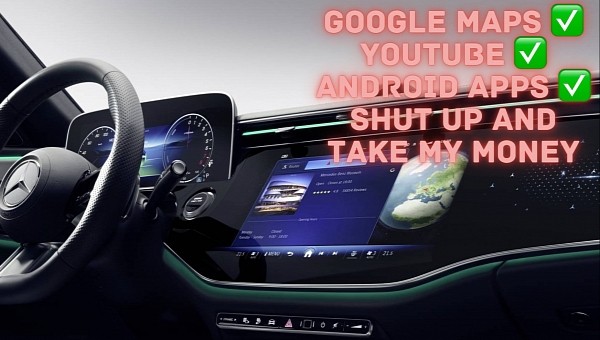The next version of Mercedes’ operating system will boast a series of smart capabilities powered by Google services, despite the company not adopting Android Automotive.
The German carmaker has signed a licensing agreement with the search company to bring the Google Maps platform, YouTube, and Cloud to MB.OS. The operating system is projected to launch next year on the first vehicles.
The collaboration is unusual at first, especially as Google typically provides such capabilities as part of Android Automotive.
Mercedes-Benz will use Google’s services on a Linux-based operating system, with the underlying technology for navigation to be provided by Google.
The auto manufacturer has more ambitious plans for its operating system, and Google is playing a key role. The company wants to build its own navigation solution whose route guidance will be powered by the Google Maps platform. The interface will be different, and Mercedes will try to adapt the experience to retain its brand identity, but the underlying technology will be based on Google Maps.
Google’s platform will be in charge of providing real-time traffic information, route guidance, and details on the displayed points of interest. Mercedes is expected to contribute with personalized data, such as the location of dealerships, service centers, and charging stations.
At the same time, Mercedes also wants to use Google Maps as the foundation of more advanced capabilities for autonomous systems. For example, the company could rely on Google Maps for speed information, something that’s already available for vehicles running Android Automotive.
The first feature powered by the partnership between Google and Mercedes is rolling out to vehicles running an up-to-date version of MBUX. Place Details is a feature that allows drivers to find information about businesses and places across the world based on data available on Google Maps. Users can see business hours, photos, and ratings imported from the maps platform.
YouTube is making its way to Mercedes-Benz vehicles in a way that Android Auto users have been requesting for years. The application will allow vehicle occupants to watch videos when the vehicle is parked. Mercedes hasn’t mentioned whether YouTube would be allowed to continue video playback on secondary screens installed in the cabin even when the vehicle is in motion.
Mercedes’ partnership with Google proves essential applications like Google Maps and YouTube can make their way to cars without the need for adopting Android Automotive.
German carmaker BMW is trying a different approach. The company did not agree to provide Google with full access to its vehicles, so instead of using Android Automotive, the company plans to adopt an open-source version, not shipping with Google services pre-loaded. As a result, BMW would be able to provide customers with Android capabilities without Google reading the data.
Mercedes says it’s also working on a MBUX API for Android that will allow the installation of other apps built for Google’s mobile operating system on its operating system.
The collaboration is unusual at first, especially as Google typically provides such capabilities as part of Android Automotive.
Mercedes-Benz will use Google’s services on a Linux-based operating system, with the underlying technology for navigation to be provided by Google.
The auto manufacturer has more ambitious plans for its operating system, and Google is playing a key role. The company wants to build its own navigation solution whose route guidance will be powered by the Google Maps platform. The interface will be different, and Mercedes will try to adapt the experience to retain its brand identity, but the underlying technology will be based on Google Maps.
Google’s platform will be in charge of providing real-time traffic information, route guidance, and details on the displayed points of interest. Mercedes is expected to contribute with personalized data, such as the location of dealerships, service centers, and charging stations.
At the same time, Mercedes also wants to use Google Maps as the foundation of more advanced capabilities for autonomous systems. For example, the company could rely on Google Maps for speed information, something that’s already available for vehicles running Android Automotive.
The first feature powered by the partnership between Google and Mercedes is rolling out to vehicles running an up-to-date version of MBUX. Place Details is a feature that allows drivers to find information about businesses and places across the world based on data available on Google Maps. Users can see business hours, photos, and ratings imported from the maps platform.
YouTube is making its way to Mercedes-Benz vehicles in a way that Android Auto users have been requesting for years. The application will allow vehicle occupants to watch videos when the vehicle is parked. Mercedes hasn’t mentioned whether YouTube would be allowed to continue video playback on secondary screens installed in the cabin even when the vehicle is in motion.
Mercedes’ partnership with Google proves essential applications like Google Maps and YouTube can make their way to cars without the need for adopting Android Automotive.
German carmaker BMW is trying a different approach. The company did not agree to provide Google with full access to its vehicles, so instead of using Android Automotive, the company plans to adopt an open-source version, not shipping with Google services pre-loaded. As a result, BMW would be able to provide customers with Android capabilities without Google reading the data.
Mercedes says it’s also working on a MBUX API for Android that will allow the installation of other apps built for Google’s mobile operating system on its operating system.























